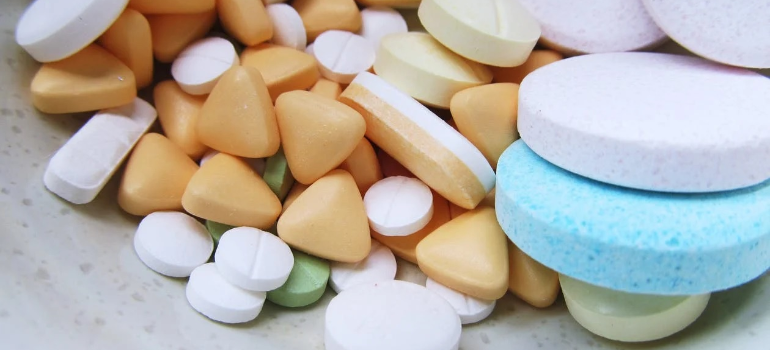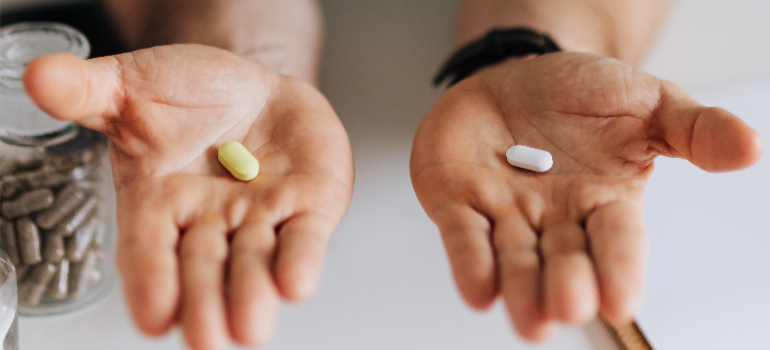Without a doubt, substance abuse is a very prevalent challenge of our times. Substance Use Disorders (SUDs) affect different demographics with comparable frequency, and swiftly lead to health complications and even overdose deaths. Prescription drugs, illicit drugs, and even legal substances can kindle addiction, often inescapable without treatment. Still, you may not know what to expect during substance abuse treatment in WV, and uncertainty might discourage you.
If that’s the case for you or your loved ones, we at Harmony Ridge Recovery are here to help. Over the years, our West Virginia treatment center has facilitated ample journeys to recovery from SUDs of all kinds. To help set your mind at ease, in this article we’ll outline exactly what you should expect along the way.
Defining Substance Abuse
First and foremost, let us briefly refine our terms in line with the newest research and addiction vocabulary guidelines. This introduction should help you:
- Better understand the differences among addiction-related terms, and why they matter
- Distinguish different phases of addiction and what each might signify or need from you to address
- Inform your search for addiction treatment and resources, in accord with your exact needs
That’s because there are ample verbs around substance use; “use”, first and foremost, but also descriptive derivatives like “misuse”. In turn, there are different nouns that describe different addiction-adjacent phases, like “dependence” and “addiction” itself. Everyday language doesn’t quite hold the same meanings for these words, so here we should first become specific.

Substance Use and Misuse
First, “use” now refers to the use of any addiction-relevant substance. In our context, these are:
- Legal addictive substances, such as alcohol and nicotine
- Illicit drugs, or controlled substances that might see recreational use
- Prescription drugs that might see misuse
Encountering this simple verb is something you should expect during substance abuse treatment in WV and beyond. That’s because NIDA suggests that health professionals use:
- “Use” instead of “abuse” for illicit drugs, to avoid “a high association with negative judgments and punishment”
- “Misuse” instead of “abuse” for prescription drugs “used other than prescribed”
In these same guidelines we find a thorough definition of misuse for prescription drugs specifically:
“Legitimate use of prescription medications is limited to their use as prescribed by the person to whom they are prescribed. Consumption outside these parameters is misuse.”
Still, there’s a colloquial definition of “misuse” as well. In everyday language and across some research, “use” might denote:
- Recreational use in perceived moderation
- Consumption of a single substance in typical doses instead of combinations or excessive doses
- Prolonged use within prescription parameters, in the case of prescription drugs
Thus, “misuse” might refer to an escalation from “use” in such contexts. It could mean the individual is starting to use a substance more recklessly than before. It will typically refer to misused prescription drugs, but it might carry this meaning as well.

Substance Abuse and Addiction
Within this context, then, comes “abuse”. “Abuse” can also hold a few different meanings, between NIDA’s guidance and colloquial definitions:
- “Abuse” might simply mean “use”, in reference to illicit drugs,
- It might refer to “misuse” of prescription drugs, or
- It might denote aggressive use of any addictive substance, as perceived by the user of the word
Now, as regards what to expect during substance abuse treatment in WV, you should likely expect more streamlined uses of the word. Namely, you’ll likely either see it specifically reference substance use or not see it at all. Still, since many professionals and individuals still use it too, we deemed it proper to use it here as well.
A key reason why this word matters so much is, simply, that it tends to denote an escalation into addiction. Specifically, and highlighting the proper terms for the three phases of addiction, these are:
- After some continued use or misuse of a given substance, tolerance sets in. The body begins to adapt to the substance, or “tolerate” it, requiring higher doses to achieve the intended effects. This is rather typical for prolonged prescription drug use specifically, and it doesn’t always denote an addiction is imminent – but it is a warning sign.
- After tolerance comes dependence. The body begins to adapt to substance use to such an extent it now “depends” on it to function properly. Withdrawal symptoms should emerge, making quitting the substance incredibly challenging.
- Finally comes actual addiction, as the phase beyond continued dependence. The individual becomes addicted to the substance, obsessing over it and facing powerful withdrawal symptoms that encourage further use. This is the phase when individuals tend to seek help, as dependence and its impacts become apparent.

Signs of Substance Use Disorders To Look Out for
That said, identifying addiction early, from initial substance use to dependence and beyond, may prove difficult. A thorough assessment is something you should expect during substance abuse treatment in WV, but beginning to seek help hinges on actually uncovering the problem at hand.
To help you do so, then, here we can consolidate some early warning signs of substance use and potential SUDs. First, HIS, a department of the DHHR, identifies the following physical signs:
- Bloodshot eyes, pupils larger or smaller than usual
- Changes in appetite or sleep patterns
- Deterioration of physical appearance, personal grooming habits
- Runny nose or sniffling
- Sudden weight loss or weight gain
- Tremors, slurred speech, or impaired coordination
- Unusual odors on breath, body, or clothing
Then, it pinpoints common behavioral symptoms:
- Using causes difficulties in one’s relationships
- Engaging in secretive or suspicious behaviors
- Frequently getting into legal trouble, including fights, accidents, illegal activities, and driving under the influence
- Neglecting responsibilities at work, school, or home, including neglecting one’s children
- Sudden change in friends, favorite hangouts, and hobbies
- Unexplained need for money or financial problems
- Using drugs under dangerous conditions
- Increased drug tolerance
- Misusing drugs to avoid or relieve withdrawal symptoms
- Loss of control over drug misuse
- Life revolves around drug use
- Abandoning enjoyable activities to use drugs
- Continuing to use regardless of negative consequences
Finally, it identifies common psychological symptoms:
- Appearing fearful, anxious, or paranoid, with no reason
- Lack of motivation; appearing tired or “spaced out”
- Periods of unusual increased energy, nervousness, or instability
- Sudden mood swings, increased irritability, or angry outbursts
- Unexplained change in personality or attitude
The Gateway Foundation largely agrees as well, adding deeper symptoms like:
- Poor personal hygiene
- Change in complexion
- Absenteeism
- Poor decision-making
- Theft
Symptoms do tend to vary, of course, but some of the above may warrant concern.

Identifying Substance Abuse And Addiction
Now, again, a thorough assessment is something you should expect during substance abuse treatment in WV. From an initial assessment to inform your admission and programs to continuous re-assessments to ensure proper progress, you will never have to self-diagnose or make uninformed guesses.
Still, for informational purposes, here we can cite DSM-5’s 11 SUD criteria:
- Using more of a substance than intended or using it for longer than intended.
- Trying to cut down or stop using the substance but being unable to.
- Experiencing intense cravings or urges to use the substance.
- Needing more of the substance to get the desired effect.
- Developing withdrawal symptoms when not using the substance.
- Spending more time getting and using drugs and recovering from substance use.
- Neglecting responsibilities at home, work or school because of substance use.
- Continuing to use even when it causes relationship problems.
- Giving up important or desirable social and recreational activities due to substance use.
- Using substances in risky settings that put the individual in danger.
- Continuing to use despite the substance causing physical and mental health problems.
Of course, not all SUDs will meet the same criteria above – not even ones of the same type. And naturally, very few SUDs will meet all 11. Rather, the number of criteria met will dictate the severity of an addiction:
- Two or three; mild SUD.
- Four or five; moderate SUD.
- Six or more; severe SUD.
In turn, the severity of each case of addiction will inform the levels of care an individual will receive during treatment.

What To Expect During Substance Abuse Treatment in WV
Finally, with introductions in order, here we can outline exactly what you can expect from each phase of SUD rehabilitation. We’ll first provide a broader overview, and then delve into specifics of the treatment itself.
#1 Before Initiating Treatment
The pre-treatment phase is arguably the hardest, especially if you’re seeking rehab for a loved one. During this stage you will eventually identify signs of addiction, as highlighted above. In turn, if you seek help for yourself, at this stage you should:
- Consult a physician who specializes in addiction. Before all else, you should verify you are indeed facing an SUD. With a proper diagnosis, your physician should best inform you of your exact condition and the best options to consider.
- Explore your options. Next, you and your physician should explore your options. In cases of prescription drug addiction, for example, or in cases of mild addiction, you may not need thorough rehabilitation. Rather, you may start with detox and therapy before entertaining other options, with your physician’s guidance.
- Go through the admission process. Finally, if your physician does find you need to enter rehab, you should make arrangements for treatment programs together. At this stage you can expect a thorough admission process, where your treatment providers should assist further. Typically, they should explore your financial options, outline the process, help you make financial decisions and arrangements, and so on.

#2 The Journey To Recovery
After admission, a thorough, seamless journey to recovery is what you should most expect during substance abuse treatment in WV. Regardless of which programs you will need to follow, some qualities and factors are constant and universally beneficial. Specifically, during this stage you should expect:
- Pharmacotherapy as needed. From as early as detox, your treatment providers will inform you of any medication you should receive. Pharmacotherapy needs differ drastically across different cases, as we’ll explore below.
- Continuous clinical supervision as needed. From detox to residential and partial hospitalization programs, your treatment providers will ensure you receive proper and continued clinical care. If you need it during later stages, such as outpatient programs, they will typically personalize your addiction treatment to provide it.
- A rigid everyday structure. With the exception of less intense outpatient programs, all treatment programs will to some extent entail a specific everyday structure. Inpatient programs come with specific meal times and therapy times, for instance, and outpatient programs also have therapy schedules.
- A keen focus on progress-based therapy. Similarly, all programs will strongly focus on phase-appropriate therapy. Each phase will focus on therapies most suitable for your progress, as we’ll cover next.
- Respect for your rights as a patient. Finally, all treatment providers are required by law to always respect your rights as a patient. These include your right to access your medical records, the right to informed consent, and more.

#3 Post-Rehabilitation
Finally, what you should always expect during substance abuse treatment in WV is thorough planning for your eventual post-rehabilitation phase. This phase is just as crucial, as it substantially helps with relapse prevention. Specifically, during this stage you should:
- Have acquired trigger avoidance and stress management skills, which will help ward off relapse
- Maintain open communication channels with your treatment providers, so you can receive help as needed
- Join, or be encouraged to join as needed, support groups such as 12-step based programs
- Begin to reintegrate into everyday life, including pursuing personal, academic, or professional goals
- Continue to receive medication for non-SUD conditions or disorders as needed to secure rehabilitation
This final phase, of course, does not exist in a vacuum. Every step to recovery should lead to a robust post-rehabilitation phase, where you can maintain abstinence to grow and thrive. This is why the middle phase, addiction treatment itself, is as vital as it is; it cements freedom from addiction.

Types of Programs To Expect During Substance Abuse Treatment in WV
To explain this, here we can outline the typical journey to recovery step-by-step.
Naturally, each journey will differ; a mild SUD might only require detox and outpatient treatment, for instance. Addiction treatment providers should always base programs on the individual’s progress and emerging needs, instead of following linear, rigid structures. Still, a typical journey to recovery will begin with detox, proceed to treatment programs, and conclude with aftercare.
#1 Medical Detox
For most cases where addiction has taken hold, medical detox is necessary to allow the body to heal. With the help of FDA-approved medications, this phase offers a safe clinical environment where the individual can overcome withdrawal symptoms. Because of this phase’s demanding nature, not all treatment centers will offer this service. Thankfully, however, there are ample options for medication assisted treatment West Virginia treatment providers will present you with.
Medical detox tends to be referred to as Medication-assisted Treatment (MAT). In line with NIDA’s recommendations above, however, please note you may also see treatment providers refer to this term as:
- “Medication for a substance use disorder”, in the case of addiction to legal or illicit substances
- “Medication for opioid use disorder” (MOUD), in the case of opioid addiction
- “Pharmacotherapy” and “addiction medication” for broader uses
This stage tends to last for 1-2 weeks, but may extend to 3 depending on the case.

#2 Inpatient Programs
After successful detox, treatment programs can begin. The most typical programs for all but the mildest cases tend to be residential or inpatient programs – so they’re ones you should expect during substance abuse treatment in WV.
As the name suggests, inpatient drug rehab in WV and beyond has the individual stay at designated residential facilities. Such programs offer a safe, supervised environment, where the individual can receive proper medical and clinical care as needed. At this stage, pharmacotherapy comes into focus as needed, and therapy mostly revolves around personal needs, including:
Inpatient programs tend to last for 1 month, but may extend to 3 or more depending on the individual’s needs and progress.

#3 Outpatient Programs
As the more typical next phase of recovery to expect during substance abuse treatment in WV come outpatient programs. As the name suggests, outpatient programs allow the individual to reside at home and receive therapy at specific times weekly. Such programs primarily come in two varieties:
- Outpatient Programs (OPs), which are less intensive and cater to milder cases, and
- Intensive Outpatient Programs (IOPs), which are more intensive and work best for moderate and severe SUDs.
In recent years, addiction treatment providers tend to suggest the latter between the two. The typical intensive outpatient program West Virginia providers offer will begin to focus strongly on behavioral therapy, including:
- Cognitive Behavioral Therapy (CBT)
- Dialectic Behavior Therapy (DBT)
- Rational Emotive Behavior Therapy (REBT)
- Eye-Movement Desensitization and Reprocessing (EMDR)
Finding The Right Substance Abuse Treatment Program
Having covered what to expect during substance abuse treatment in WV, here we may conclude on an important note. Specifically, here we may cover some unique offerings you may look out for as you go through treatment provider candidates.
In no particular order, consider the following.
#1 Co-Occurring Mental Health Disorders
First, if you or your loved ones receive a dual diagnosis you will need specialized treatment. A dual diagnosis will find SUDs that co-occur with mental health disorders such as:
- Anxiety
- Bipolar disorder
- Depression
- Eating disorders
- Personality disorders and borderline personality disorders
- Schizophrenia
- Trauma
- OCD
- ADHD
- PTSD
Needless to say, such cases require deeper care; psychotherapy, medication, and so on. Conventional rehab will typically not suffice for such cases, where a mental health disorder kindles an SUD and vice versa.
#2 Co-Occurring SUDs
Second, SUDs very commonly overlap with other SUDs. This may occur when the individual combines different drugs and substances, as ResearchGate data finds.
In such cases, an individual might need specialized SUD services for any combinations among the following:
- Alcohol rehab, when SUDs overlap with Alcohol Use Disorder (AUD)
- Cocaine rehab
- Stimulants rehab
- Heroin rehab
- Marijuana rehab
- Opiate rehab
- Meth rehab
- Fentanyl rehab
- Ambien rehab
- Barbiturates rehab
- Benzodiazepine rehab
In brief, you should at all times ensure your treatment providers deeply understand and can cater to specific SUDs. If you would like to know more about a specific SUD, you can kindly follow the relevant links above.

#3 Unique Personal Needs
Third, program personalization is generally a perk to expect during substance abuse treatment in WV. However, your demographic, background, or other factors might introduce additional unique needs. Consider, for example, how the following types of specialized addiction treatment differ:
- Rehab for professionals, which tends to focus on maintaining employment.
- Rehab for pregnant women, which includes unique educational material and faces complex physical and emotional challenges.
- Intensive rehab for young adults, which will most often focus on healthy development and achieving academic goals toward employment.
- Rehab for seniors, which accounts for unique physical and mental needs of the elderly.
- Rehab for veterans, which very commonly focuses on dealing with trauma and other mental health issues.
To account for this factor, you should ensure your treatment provider candidates don’t opt for one-size-fits-all solutions. Much like rehab programs themselves, addiction treatment needs to embrace personalization to best meet each case’s unique needs.
#4 Costs and Insurance Coverage
Finally, rehab costs tend to discourage many from seeking help – and understandably so. As such, especially since rehab insurance coverage can vary significantly, you should first ensure your candidates accept major health insurance providers such as:
In addition, their representatives and admissions team should thoroughly explore financing options with you in advance. They should be able to verify your exact coverage, suggest alternatives as needed, and help you make arrangements. Setting your mind at ease should help reassure you and encourage you to seek the help you need and deserve.

Substance Abuse Treatment in WV; Harmony Ridge Recovery is Here For You
While brief, this article has hopefully informed you on what to expect during substance abuse treatment in WV rather sufficiently. The journey to recovery is a long, complex process that very often needs to hinge on each case’s unique needs. As such, exploring all potential routes and complications in one sitting would likely prove impossible.
Still, we understand you may have more questions on SUDs, treatment programs, payment options, and more. If so, please feel free to contact us today and let us know how we can help. Our teams will be more than happy to assist you or your loved ones on your unique journey to recovery.



